A recent BBC article highlighted a surprising trend: books written entirely by artificial intelligence, some mimicking the style of real authors, are being sold online – sometimes under misleading names. With platforms like Amazon flooded with AI-generated content, the world of storytelling is shifting rapidly. But what does this rise in artificial storytelling mean for drama teachers, young creatives, and the future of theatre education?
A new age of storytelling – but at what cost?
At first glance, being able to write a full-length novel or script in minutes might feel like a modern miracle. AI tools can generate character arcs, plot twists, and even imitate the voices of beloved writers. For teachers and students juggling a million things, this might seem like a gift, and at times, it is. Educators are also being encouraged to use AI to tackle their workload and there are many tools to help with this.
But while AI-generated stories can be clever and even creative, they also raise important questions: What happens to originality? What is the value of the artistic process? And where do we draw the line between helpful support and creative shortcut?
Human stories vs machine-made ones
Drama – whether on stage, screen or page – is more than just plot and dialogue. It’s about meaning. It’s about heart. It’s about the lived experiences, emotions, and connections that make us human. And at the bottom of all that is the plight of the human experience – the joys, the laughter and the pain.
AI can produce convincing scripts with neat structure and a sprinkle of metaphor. But it doesn’t feel. It doesn’t live. It has never fallen in love, lost a parent, stood on a stage with trembling hands, or laughed so hard it cried. It can guess – but it cannot know.
That’s a key message for drama teachers. We’re not just teaching performance – we’re teaching about presence in this world and about what it means to really live.
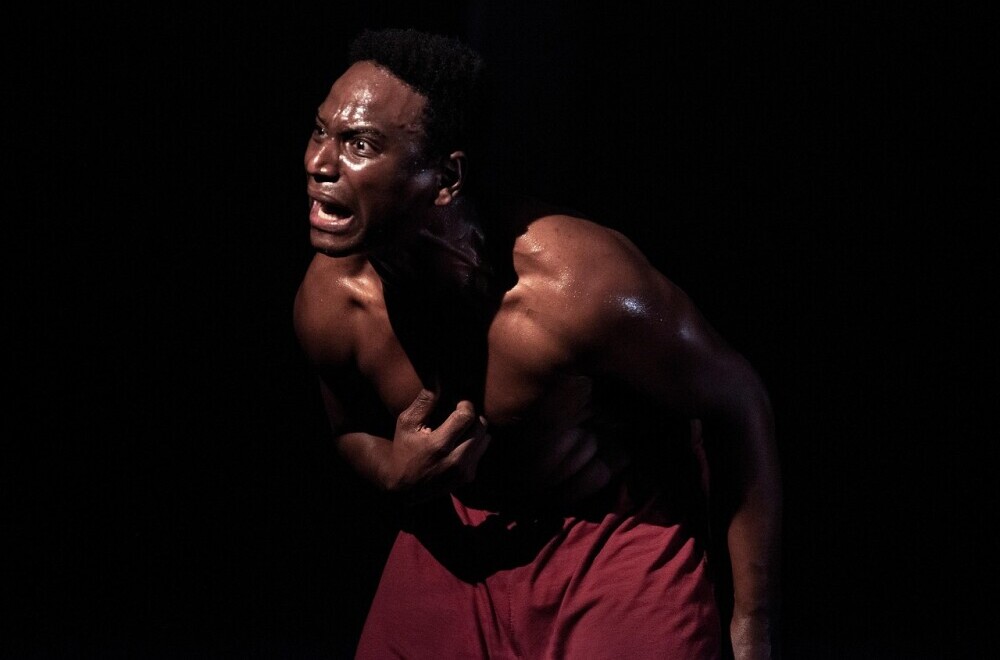
What does this means for drama teachers?
With AI tools becoming more accessible and appealing, students may be tempted to use them to generate monologues, write scenes, or even complete coursework. This isn’t necessarily a problem – in fact, AI can be a fantastic launchpad for creativity. But we must help students strike the right balance.
Here are a few useful teaching points:
- ✅ Encourage students to use AI for brainstorming, not for bypassing the creative journey
- 🎭 Use AI scripts as case studies: What works? What feels flat? What’s missing?
- ✍️ Compare AI and human writing: How do tone, depth, and emotional resonance differ?
Rather than banning AI, we can guide students to engage with it critically and creatively. After all, if we are using it to plan our lessons, it would seem rather hypocritical to ban our students from learning about it too!
The quick fix trap
There’s a growing cultural mindset – especially in digital spaces – that faster is better. Why spend hours writing when AI can do it in five minutes?
But drama teachers know that process is everything. You only have to read a Dorothy Heathcote essay to know that! Rehearsals matter. Drafts matter. Mistakes matter. That’s where young people learn empathy, resilience, collaboration, and courage. You can’t rush growth and you can’t outsource discovery.
And you certainly can’t skip the bit where a student finds their voice, learns to speak up authentically and realise the power they have when they do!
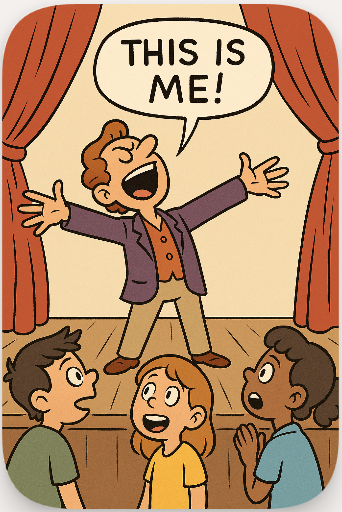
Protecting student voice in an AI age
AI is getting better at sounding human. That’s both impressive and slightly unnerving, especially for students who are still figuring out who they are and their place in this world.
Drama is, at its core, an exploration of identity. Writing a script or devising a scene is an act of self-expression and this is to be encouraged. Each student has a unique and valid perspective on life, one which can be used to help others on a similar journey. If students rely too heavily on AI, they risk losing that opportunity to shape and share their unique perspective – one that can see the boundaries and challenge them, or understand the rules and then break them!
As educators, we need to protect that journey. Whether they’re writing, acting, directing or designing, their voice matters. AI can assist – but it mustn’t replace.
Should we use AI-generated scripts in class?
Some teachers may be curious about using AI-created scripts in rehearsals, assessments or devising work. There will never be a ‘right’ or ‘wrong’ here, like life. But there will be times when things seem more appropriate than others. Here are a few pros and cons to weigh up:
Pros:
- Quick, customisable content for drama games or workshops
- Unbiased starting points for devising or analysis
- Opportunities for critical thinking and adaptation
Cons:
- Often lacks emotional nuance or subtext
- Can feel clichéd or flat in performance
- Might encourage shortcut thinking over skill-building
Top Tip: If you do use AI-generated material, frame it as a starting point – not a finished product. Invite your students to reclaim the story and add their own humanity to it. For example, I’ve used AI to generate the image below – what does it say? What does it NOT say?
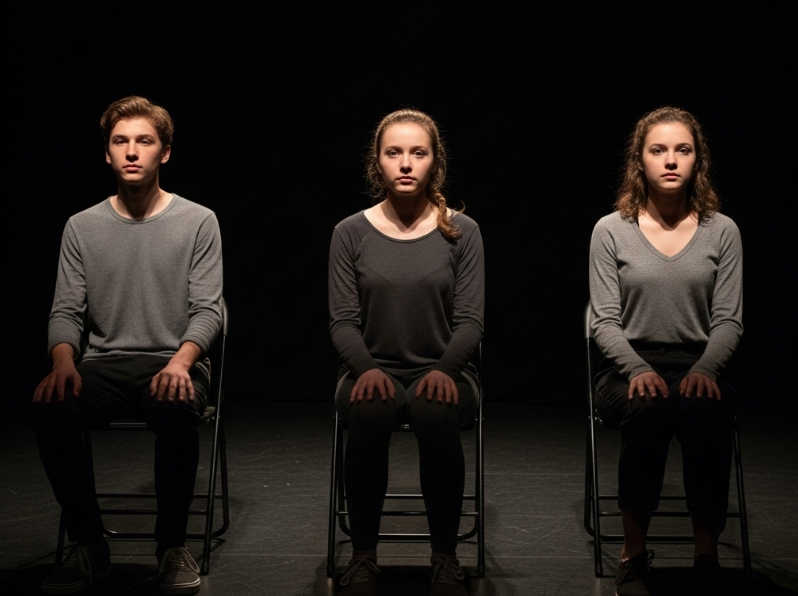
Creative activity idea using AI: Make it your own
Try this practical classroom challenge:
🎭 Generate a short AI-written monologue (you can use something like ChatGPT for this).
🎭 Have students perform it, then discuss:
– What worked?
– What didn’t?
– How would you rewrite it?Follow it up with a devising challenge: “Reclaim the story – make it human.”
This activity works particularly well at GCSE and A-Level, especially in units focused on dramatic structure or monologue form, or as part of a class on devising.
Exploring ethics and authorship
AI in drama education isn’t just about tools – it also opens up rich discussions around ethics and ownership so don’t skip over these important questions. You could explore dilemmas like:
- Should AI-generated work be clearly labelled in assessments?
- If AI mimics an author’s style, is that fair use – or plagiarism?
- Who owns the rights to a script written by AI?
These questions connect beautifully with themes of authenticity, creative integrity, and the evolving role of the artist. As a society, we are still figuring out the answers, but it will be your students who will ultimately be the next generation making the decisions.
Going forward
AI is here to stay – and it’s already EVERYWHERE! And yes, I have used AI to help me draft the outline for this article.
AI is changing how we write, perform, and consume stories. But that doesn’t mean human storytelling is obsolete. Quite the opposite.
In drama classrooms, the magic still lies in the unpredictable and he messy. In the deeply felt and fiercely original way that can only come from the human experience. Where does AI get its ‘ideas’ from anyway? From the vast expanse of human knowledge written and recorded through aeons of history, that’s where!
So utilise it but acknowledge that the true magic comes from the moment when a student dares to speak from their heart, not from a prompt.
Let’s embrace AI for what it can do, without forgetting what it can’t. The future of storytelling needs both technology and truth.
Let me know your thoughts and ideas on this in the comments below. Are you using AI in the classroom? If so, how?
Related posts
Drama cover lesson ideas for non-specialist teachers
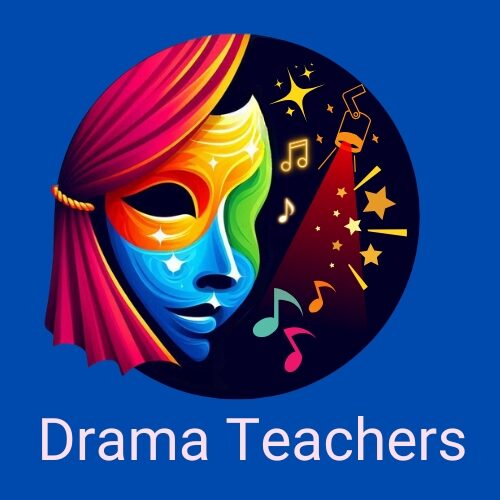
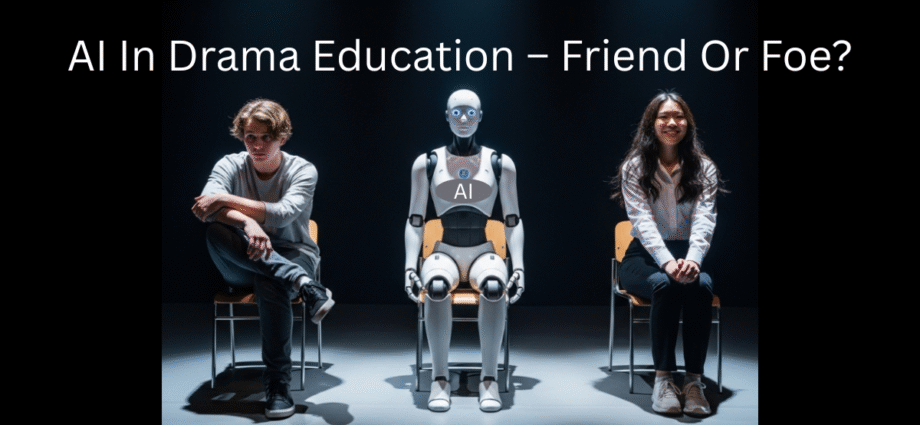
This is such a thoughtful and timely discussion about AI in drama education. You raise some important questions that really matter for teachers and students alike.
Questions I’d ask after reading:
How do students feel when using AI to create their work—do they see it as helpful or hollow?
What strategies can help young creatives stay connected to their own voices?
Discussion:
I agree that AI can be a helpful tool for brainstorming or exploring structure, but it’s not a replacement for real human experience. Drama is all about authenticity, vulnerability, and discovery. Using AI too much could risk losing those deeper lessons that make theatre so powerful.
Experience:
I’ve used AI tools to generate script ideas and prompts for workshops, and while they were useful for sparking discussions, the pieces often felt flat until we layered in students’ own stories and perspectives. That transformation—from something generic to something alive—is what makes drama so special.
Opinion:
Overall, I think AI is neither an enemy nor a savior—it’s just a tool. The key is guiding students to use it critically and creatively without letting it replace the messy, beautiful process of finding their own voice.
Thanks for such a balanced and insightful article. It’s exactly the kind of conversation drama educators need to be having right now.
Hi Linda. Thanks for your very thorough and thoughtful comments on my article about AI and drama education. I agree and think that this is a debate and topic that all educators will need to have in whatever subject they teach. I think that I agree with your point about students needing to add in their own experiences and ideas to AI starting points because it gives them more ownership and more ideas about characterisation, definitely.
I too believe that AI is a great tool, but we need to master it, like all good tools, and then we can use it to our advantage. In my book, the whole of education needs a revamp to keep up with modern technology and working practices and AI is just one of many new issues that education needs to address.
Thanks for stopping by and I hope to see you again soon. Gail
This was such a powerful and necessary read — thank you for writing it. The balance you struck between the possibilities of AI and the irreplaceable depth of human storytelling really hit home. As someone who’s also exploring how to sell online using AI tools, I’ve seen firsthand how tempting it is to chase speed over substance. But in the context of drama and education, it’s clear: the process is the product.
I especially loved your idea of using AI scripts as springboards for critical thinking and reinterpretation. That blend of tech and human creativity is where the real magic happens. And your point about protecting student voice in an AI age? Spot on.
Have you found any specific AI tools that strike a better balance between structure and emotional tone?
Hi Mike. Thanks for reading the article and leaving your insightful comments. I’m so pleased that you found it useful and timely. AI is part of our lives now whether people like it or not, so the best thing to do I think, is to acknowledge it and learn to use it to our advantage rather than just moaning about it. To answer your question, I like using Chat GPT because I can ‘train’ it to work the way I do. I’m sure you can do that with most of the systems if you want to but some of them don’t have the same memory capabilities as others. Like all these new tools, it’s only really as good as the user, so I’d advise people to learn how to use them properly and you will get the best out of them. If you’re really interested in AI, you can read another blog I have which has more about AI. You can read that at http://www.myonlineincome.org and I particularly recommend you to read the article on AI in business there.